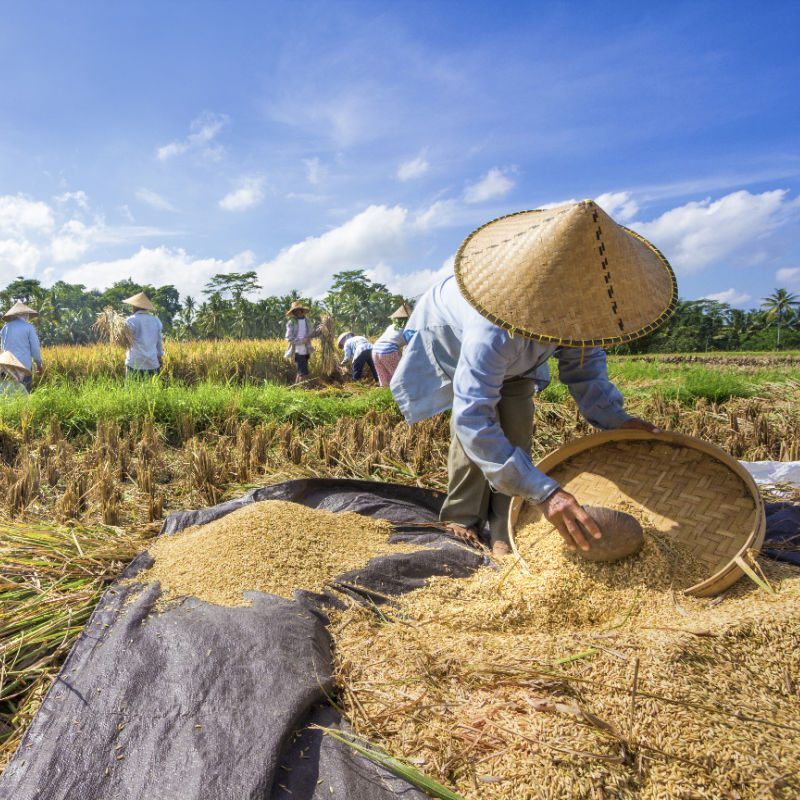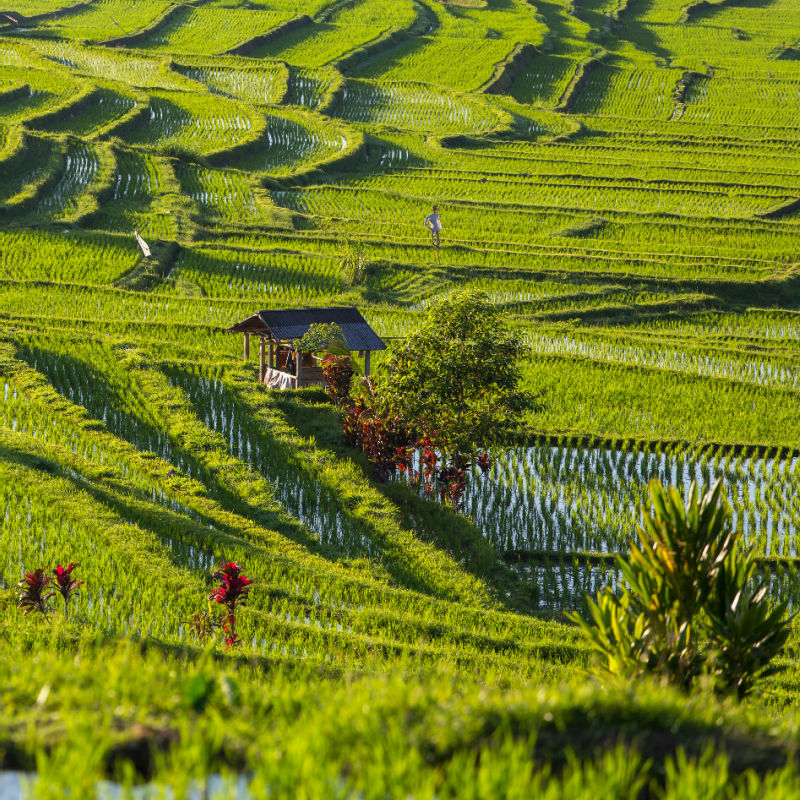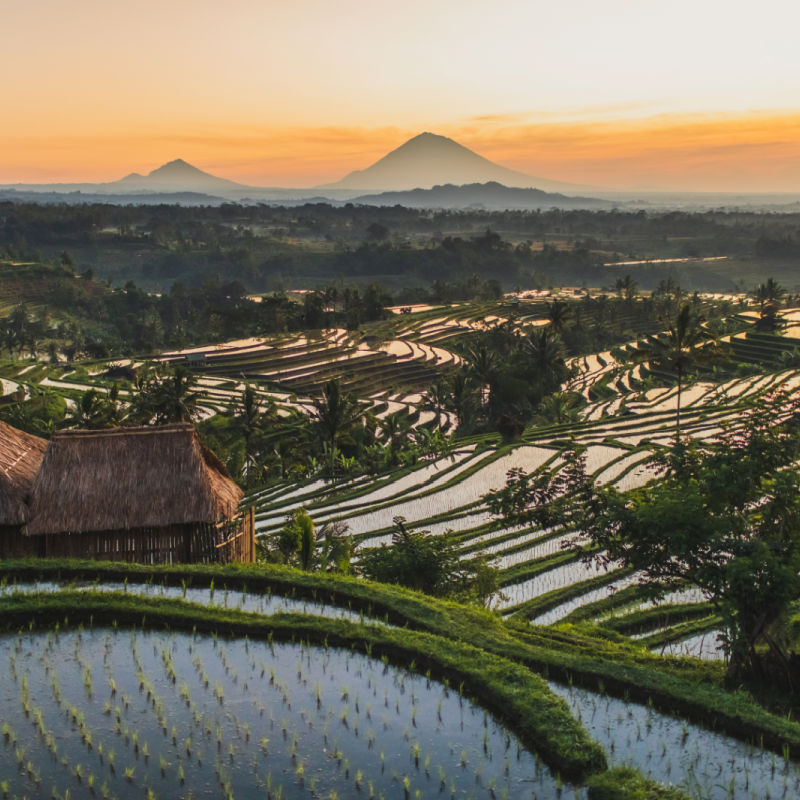The leaders in charge of managing Bali’s UNESCO Jatiluwih Rice Terraces are warning that the threats faced to the island’s traditional rice terraces are real.
The rapid conversion of agricultural land to tourism and commercial development poses very real and lasting impacts on Balinese communities and the wider landscape.

Leaders at Jatiluiwh have spoken of how farmers in Bali are being ‘attacked’ from all angles. With increasing pressure to sell up their land to developers and as the cost of farming rises and the market value of crops falls, farmers are torn between keeping their cultural heritage alive, protecting their livelihoods, and the cost of their future stability.
Ketut Purna, the operations manager for Jatiluwih Rice Terraces, told reporters, “What we are afraid of is that there will be buildings in the middle of the rice fields.”
“Therefore, we made the Jatiluwih Village Regulation (Perdes) so that our natural sustainability is maintained so that it is not like our neighboring areas.”
With new buildings banned on the Jatiluwih Rice Terraces and doubly protected by their UNESCO World Heritage Status, Purna, and his community are hopeful that sustainable tourism development can help keep this farming community thriving.
Over at the Tegalalang Rice Terraces, the impact of converting rice paddies to tourism development can already be seen, with huge resorts and day clubs built on ancient rice paddies and overlooking what remains.
For the farmers of Jatiluwih, it is not only the pressures of development that are a cause for concern but also the impacts of the climate crisis.
Purna told reporters, “That is not the will of the farmers but simply because the water sources are reduced. Because of El Nino, the change in seasons reduced the water discharge, and many wet farms changed into plantations.”
As a tourist destination, Jatiluwih works in partnership with the local community to keep farmers enthusiastic about working in the rice fields.
One initiative that has proved impactful is providing incentives to farmers to tune 26% of their net income from selling entrance tickets to the subak area.
Purna added, “Every six months, we also subsidize farmers’ fertilizer between IDR 400-600 million.”
However, for many environmentalists, the widespread use of fertilizer is also a contributing issue, leading to a reduced nutritional density of crops, soil degradation, and toxic runoff into waterways and the subak system.

In order to preserve the traditional rice cycle and the cultural heritage of the region, Subak Jatiluwih farmers organize their members to start the year with the mandatory planting of heritage red rice in January, which is ready to harvest in July.
For the second cycle of the year, subak members are free to plant other varieties of rice, which are usually faster-maturing rice varieties such as commercial white rice crops.
Sustainable, regenerative tourism could be one way to help conserve the Jatiluwih Rice Terraces, and the community is celebrating a big win this week.
Jatiluwih has been named among the winners of the world’s best Tourism Village Awards 2024 by the United Nations World Tourism Organisation.

Purna told reporters, “Astungkara, this is an amazing award. Thanks to the support of all the people, Jatiluwih Village received the award of one of the best villages in the world in 2024.”
“One of the concerns is the preservation of cultural heritage, preserving the environment, and the development of tourism with full responsibility.”
He added, “Of course, this is not only because of us but also because of the people in Jatiluwih Village who are both committed and have put forward the Tri Hita Karana philosophy to receive this award.”

Jatiluwih Rice Terraces are open to visitors seven days a week. International tourist tickets cost IDR 50,000 per adult and IDR 40,000 per child.
The sunrise experience, which operates daily from 6 am to 8 am, is not to be missed. The experience costs IDR 150,000 per person, and includes entry to the rice terraces for the day, as well as a cup of red rice tea and Balinese snacks made from red rice grown on the terraces.
Remove All Ads & Unlock All Articles… Sign up for The Bali Sun Premium

Plan Your Bali Holiday:
Book The Best English Speaking Drivers For Airport Transfers & Tours
Choose From Thousands of Bali Hotels, Resorts, and Hostels with Free Cancellation On Most Properties
Book Cheap Flights To Bali
Don’t Forget Travel Insurance That Covers Medical Expenses In Bali
For the latest Bali News & Debate Join our Facebook Community
SUBSCRIBE TO NEW POSTS
Enter your email address to subscribe to The Bali Sun’s latest breaking news, straight to your inbox.
Discover more from The Bali Sun
Subscribe to get the latest posts sent to your email.
